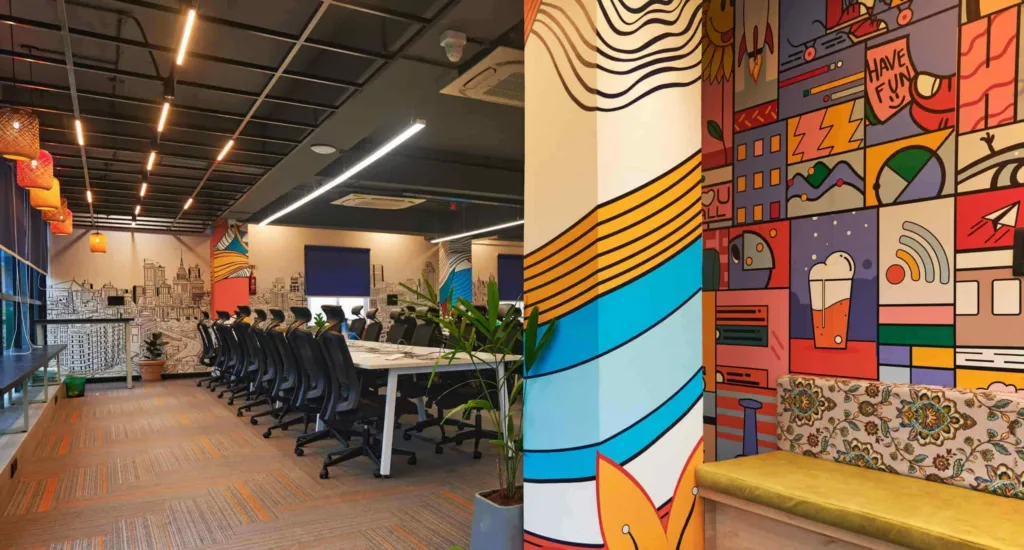
In today’s fast-evolving business landscape, companies are eager to tap into local talent but often struggle with the challenges of establishing physical offices across multiple locations. The synergy between Global Capability Centres (GCCs) and flexible workspaces is driving a fundamental shift in how businesses expand and operate.
Beyond just transforming office spaces, this collaboration is redefining how global enterprises function, innovate, and scale. By integrating GCCs with flex spaces, businesses gain seamless access to diverse talent, enhance operational efficiency, and leverage advanced infrastructure—while maintaining the agility and cost-effectiveness needed to stay competitive.
India has emerged as a global powerhouse for Global Capability Centres (GCCs), reinforcing its position in the international business landscape. The country now hosts over 1,800 GCCs, supporting more than 1,400 global corporations. In the past two years alone, over 100 new centres have been added, reaffirming India’s appeal for multinational enterprises optimizing global operations. This expansion is driven by the increasing complexity of international business, the need for strategic market proximity, and India’s cost advantages.

The Growing Affinity of GCCs for Flex Workspaces
A major trend shaping the future of India’s commercial real estate market is the growing reliance of GCCs on flexible workspaces. In 2024, cost efficiency and an asset-light real estate approach have propelled many enterprises to adopt flex workspace solutions. GCCs are strategically identifying emerging micro-locations within cities that offer strong connectivity, better amenities, and a thriving business ecosystem. The demand for workspace flexibility is also prompting organizations to adopt innovative office designs that accommodate evolving business needs.
The Rise of Mid-Market GCCs and Their Flexible Workspace Needs
For years, India’s GCC landscape was dominated by large multinational enterprises. That’s now changing. Mid-market companies are emerging as a significant growth driver. They now make up nearly 50% of India’s total GCC landscape. By 2026, more than 120 new mid-market GCCs are expected to be established, reinforcing the demand for agile, managed workspace solutions.
Sectoral Expansion and Increased Flex Space Demand
The expansion of GCCs is being driven by multiple sectors, with BFSI, e-commerce, and technology companies accounting for nearly 58% of total leasing activity. Additionally, life sciences, FMCG, and retail enterprises are leveraging India’s skilled workforce and dynamic business environment to establish stronger operational bases. Engineering and manufacturing firms are also scaling up in India, benefiting from growing infrastructure investments and a thriving innovation ecosystem.
GCCs: Catalysts for Digital Transformation
GCCs are no longer just back-office hubs; they have evolved into strategic business partners driving digital transformation. India-based GCCs lead cutting-edge research, innovation labs, and AI-driven business solutions. As companies expand their workforce and technological capabilities, the demand for larger, sophisticated office spaces is set to surge in 2025.
India’s GCC Ecosystem: The Future of Global Business Operations
GCCs in India are evolving into digital twins of their global headquarters, integrating business functions while enabling real-time collaboration. Indian talent is gaining international recognition, with over 60 CIOs and SVPs from Indian GCCs transitioning into top global leadership roles. Additionally, GCCs are actively engaging with startups, harnessing India’s entrepreneurial energy to co-create disruptive solutions. As enterprises transition to a hybrid GCC-service provider model, they are blending in-house expertise with strategic outsourcing to enhance efficiency and agility. This shift is reinforcing India’s status as a premier hub for next-generation GCCs.
The Road Ahead
With over 800 new GCCs expected in the next five to six years, the demand for flexible, scalable, and cost-efficient workspaces will only intensify. As companies advance digital transformation and prioritize employee-centric work models, India’s flex workspace market will play a pivotal role in redefining global business operations.
About Author
The author is the Founder of Hanto Workspace and holds a degree in Electrical and Electronics Engineering from IIIT Hyderabad. He has worked on various technology projects and participated in global competitions, including the World Embedded Software Contest and NASA’s CANSAT challenge. His experience spans entrepreneurship, strategy, and workspace solutions. Through Hanto Workspace, he focuses on developing flexible and cost-efficient office environments to meet the needs of global businesses.

